
"I hope you mess this up! I hope you blow it big-time! You're supposed to be smart. You think you're smart, right?"
Reese, just fourteen, is serving time at Progress--a juvenile detention center. Because he's shown promise in the twenty-two months he's been there, he's chosen for a new work program. He'll be working ten days a month at Evergreen, an assisted living center for senior citizens. He's hoping that his good behavior and his new and improved attitude, will help him get released sooner.
But. Nothing is ever that easy. Life at Progress isn't easy. No matter how much he tries to stay out of fights, tries to not let himself be provoked into bad situations, Reese struggles. Daily. Reese never expected to find a role model at Evergreen. Especially one as cranky as Mr. Hooft. This "friendship" is a struggle too. But it's worth it.
I liked Lockdown. I liked Reese. It was an easy read, a compelling one. I would recommend this one.
© Becky Laney of Becky's Book Reviews
Viewing: Blog Posts Tagged with: teens in trouble with the law, Most Recent at Top [Help]
Results 1 - 13 of 13
Blog: Becky's Book Reviews (Login to Add to MyJacketFlap)
JacketFlap tags: HarperCollins, YA Fiction, YA realistic fiction, teens in trouble with the law, 2010, library book, Add a tag
Blog: Becky's Book Reviews (Login to Add to MyJacketFlap)
JacketFlap tags: J Historical Fiction, brothers and/or sisters, J Fiction, teens in trouble with the law, J Mystery, 2000, library book, Add a tag
Dovey Coe. Frances O'Roark Dowell. 2000. Simon & Schuster. 192 pages.
My name is Dovey Coe, and I reckon it don't matter if you like me or not. I'm here to lay the record straight, to let you know them folks saying I done a terrible thing are liars. I aim to prove it, too. I hated Parnell Caraway as much as the next person, but I didn't kill him.
Loved this one. Loved the way it started out too! (What do you think?! Would you want to read more after reading that first paragraph?!) Frances O'Roark Dowell has a way with words, a way with characters. And she did a wonderful job in describing the Coe family and the mountain community in which they live.
Dovey Coe does not like Parnell Caraway hanging around her sister, Caroline. Doesn't like the fact that her oh-so-beautiful sister doesn't reject him outright. Doesn't like the fact that her sister might just be reconsidering her plans. You see, Caroline wants to go to college, wants to be a teacher. But Parnell is trying to do anything and everything to make her change her mind. The pretty words he's been saying. The drives they've been taking in his car. The promises of a rich future they could have...together. But not all his words sound so pretty--some are quite ugly. Will Caroline make the right choice? And what will her choice mean for the rest of the Coe family?
This book would be perfect for the Southern Reading Challenge.
© Becky Laney of Becky's Book Reviews
Blog: Becky's Book Reviews (Login to Add to MyJacketFlap)
JacketFlap tags: school, YA Fiction, brothers and/or sisters, dysfunctional families, 2008, YA Romance, YA realistic fiction, teens in trouble with the law, Walker Books, Bloomsbury USA, review copy, Add a tag
Perfect Chemistry. Simone Elkeles. 2008. [December 2008] Walker & Company (Bloomsbury). 368 pages.
Everyone knows I'm perfect. My life is perfect. My clothes are perfect. Even my family is perfect.
Brittany looks like she has the perfect life. A life that includes the perfect boyfriend. But. Appearances can be deceiving. Brittany is keeping more than a few secrets. Not wanting anyone at school to know how her home life really is. She doesn't want anyone to see the real her. Brittany has a role to play, control to maintain.
Alex, our other narrator, doesn't even pretend to have the perfect life. (Though that doesn't mean he's not pretending about other things.) There are thousands of rumors going round about him at school. And some of them are true. Not all of them, mind you. But some of them. Like the fact that he's a gang member. Like the fact that he's been arrested.
Destiny steps in when the chemistry teacher pairs these two (from opposite sides of town) as lab partners. These two teens have nothing in common (so they think) and don't want anything to do with each other. At first. Brittany just doesn't know what to make of Alex, his teasing, his charisma. Does he really like her? Does he really understand her more than Colin?
Is she brave enough to go there?
I loved this one. It's not that I think it's the most perfect book I've ever read. It's not. But it's satisfying. Really satisfying. I really enjoyed these characters. I loved the development of this relationship.
There's been something nagging at me all day. As long as I'm here with him, I might as well ask. "Did we kiss last night?"If you enjoy romance, you'll probably enjoy this one. It's satisfying in the same way as 10 Things I Hate About You, Dirty Dancing, and How To Lose A Guy In Ten Days.
"Yes."
"Well, it wasn't memorable because I have no recollection of it."
He laughs. "I was kiddin'. We didn't kiss." He leans in. "When we kiss you'll remember it. Forever."
Oh, God. I wish his words didn't leave my knees weak. I know I should be scared, alone with a gang member in a deserted place talking about kissing. But I'm not. Deep in my soul I know he wouldn't intentionally hurt me or force me to do anything. (142)*
*All quotes are from an ARC. They might have been revised in the final edition.
© Becky Laney of Becky's Book Reviews
Blog: Becky's Book Reviews (Login to Add to MyJacketFlap)
JacketFlap tags: teens in trouble with the law, 2009, friendship, YA Fiction, YA Historical Fiction, YA realistic fiction, coming-of-age, Add a tag
Brown, Chris Carlton. 2009. Henry Holt. 232 pages.
It's always a clean white car--this time a Ford.
Every now and then I come across a not-for-me type book. Such is the case with Hoppergrass by Chris Carlton Brown. It is a coming of age novel. It's set in the late sixties--1969 to be precise--at an institute for delinquent teenage boys. The novel is about the harder things of life, the injustices of life--both large and small. It's also a novel about tensions between races: the whites and blacks. Our narrator, Bowser, becomes friends with Nose, a black teen, but Bowser's other friends--and Nose's other friends--can't exactly understand. These two are scripted--by their friends--to hate one another. To be enemies. But behind the scenes, these two are on good terms. But the power and authority of this institution is corrupt--very corrupt--and the lives of some teens (delinquent or not) are at risk. Bowser is one of a very small handful that realizes just how dangerous the situation is becoming. Bowser and Nose are the two facing the biggest risks.
I think there are plenty of readers out there who can appreciate this one. It's about meaning-of-life type stuff. Serious issues of justice and injustice, corruption and prejudice and the like. It's a book about friendship and courage as well. So thematically, the book has much to offer.
I think I just didn't get this book. I didn't really feel a connection with the characters and the story. I wanted to care more than I actually did.
© Becky Laney of Becky's Book Reviews
Blog: Becky's Book Reviews (Login to Add to MyJacketFlap)
JacketFlap tags: YA Romance, YA realistic fiction, teens in trouble with the law, verse novel, 2009, Add a tag
Hopkins, Ellen. 2009. Tricks. Simon & Schuster. 625 pages.
Ellen Hopkins is dependable. You know what you're going to get. No surprises. At least not after the first--once you've read one, you know what to expect: the raw, ugly, vulnerable side of teen life. The side that some adults would rather not know about--the broken and desperate side. Addictions like drugs and alcohol. Eating disorders. Cutting. Suicides and suicide attempts. Abuse--be it sexual, physical, or emotional. Hopkins' verse novels are all about the angst of growing up. Hopkins writes verse novels. (So don't let the length fool you.)
In Tricks we've got the interconnected stories of a handful of teens--two guys (Seth, Cody) and three girls (Eden, Whitney, Ginger)--who for varying reasons all end up as prostitutes. Five teens, five different circumstances, one very ugly story. This one won't be for everyone. As you can imagine--if you choose--this one is heavy in graphic depictions of sex--both homosexual and heterosexual. And that may be a turn off for some readers. You should also know that it deals with addictions. Drugs. Gambling.
It's a novel that makes you think. In the beginning, each of these teens is in a seemingly stable place. If you were to ask each character, would you ever, could you ever sell your body--each would answer, never, no way.
But while it can't please everyone, for those who have enjoyed (though enjoy is really not the right word) Hopkins' previous books, this one is undoubtedly good. I don't think you'll be disappointed. If you haven't read any Hopkins before, this might be a good place to start.
© Becky Laney of Becky's Book Reviews
Blog: Becky's Book Reviews (Login to Add to MyJacketFlap)
JacketFlap tags: 2000, friendship, school, YA Fiction, YA realistic fiction, coming-of-age, teens in trouble with the law, bullies, YA Mystery, Printz Award Challenge, "B" Titles, "P" Authors, Add a tag
 Plum-Ucci, Carol. 2000. The Body of Christopher Creed. Hyperion. 331 pages.
Plum-Ucci, Carol. 2000. The Body of Christopher Creed. Hyperion. 331 pages.
I had hoped that a new start away from Steepleton would make my junior year seem like a hundred years ago, rather than just one.
To say that The Body of Christopher Creed is haunting is an understatement. It is compellingly atmospheric. It completely draws you in. It's nearly impossible to put it down. Our narrator, Victor "Torey" Adams, is giving readers a personal glimpse into his nightmare. When the novel opens, we meet Torey. A new student--a senior--at a boarding school. We learn that there's something from his past that still haunts him. Maybe not quite so torturously as it once did. But something still holds him back from being that "normal" kid from two years ago. The football player.The musician. The boyfriend. The oh-so-normal, somewhat-popular guy. What is this something? Or should I say who is this something?
Who is Christopher Creed? Why should the reader care? The reader only sees Chris Creed through the eyes of various characters. We get impressions of him from Torey, from Bo, from Ali, from Alex and Ryan, etc. According to his classmates, Chris was weird. A definite freak. Someone who was out of touch with reality. A guy with a big, goofy grin who never knew when to shut up. Who never could quite sense when he was being obnoxious and annoying just by being there, by being himself. According to his mother, Chris was a happy, well-adjusted teen. He had no reason whatsoever to runaway from home. No reason to commit suicide. Therefore his disappearance must mean foul play. Surely, Chris, her very own son, would never of his own free will vanish. Who's the primary suspect? Well, that would be Bo, a boy from the wrong side of town. In this small-town, apparently, there is a lot of prejudice going on. It's nothing to talk trash about Boons, (folks from Boondocks; aka poor and trashy side of town, you know, where everything bad happens.) The whole town seems to have an us-versus-them mentality which is just freaky to be a little honest. But Ali and Torey believe Bo is innocent. In fact, there is a lot of disagreement. You've got folks thinking he was murdered. Folks thinking he committed suicide. Folks thinking he just ran away to get away from his controlling parents. Which of these theories is the truth? Will anyone ever be able to puzzle out the truth?
All of this is revealed through Torey. His written account of the events that led him to where he is today...to who he is today.
Writing it was supposed to bring me some quote-unquote "healing," at least that's what Dr. Fahdi had said. Maybe it did; who knows? I got a load off my chest. But I was looking for other things, more important things, like the peace you get when things make sense and life seems fair. I never got that peace. Some nights I would remember and write and remember and write, and I was sure I was just being Dr. Frankenstein, trying to re-create a dead human. The dead never come back the way they were in life. Some nights I got convinced I was creating a monster.
The story is a complex blend of realistic fiction and mystery. (It'd also be right at home in the coming-of-age genre.) And It's just-right in the drama department. Plum-Ucci is a great storyteller. The way she weaves together the story, the way she reveals it bit by bit. It's gripping and intense that's for sure. It's atmospheric as well. I feel this town almost has a persona of its own in an eery kind of way.
This book is very well done. It is easy to see why this one earned a Printz Honor.
© Becky Laney of Becky's Book Reviews
Blog: Becky's Book Reviews (Login to Add to MyJacketFlap)
JacketFlap tags: bullying, school, YA Fiction, 2008, YA realistic fiction, teens in trouble with the law, bullies, "S" Titles, "F" Authors, Add a tag
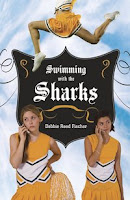
fischer, Debbie Reed. 2008. Swimming with the Sharks.
The list is titled Top Ten Guys Who Are Still Virgins. Dorkowitz tops it off at number one, of course.
I didn't care for this one. I'll be honest. It's a book about mean girls--mean cheerleaders to be exact--who go to great lengths to torture the newest cheerleader, Ellika, and 'persuade' her into quitting. Why is she on the team to begin with? Her family is rich, they made a very large contribution to the school--to the gym I believe--and this was one of the stipulations: a place for their chunky/plus-size daughter on the varsity cheering squad. Our narrator, Peyton Grady, goes along with Operation Smellika--in fact she commits several of these cruelties personally--including smashing Ellika's glasses to pieces. It isn't until bones get broken and heads get concussed that Peyton sees the bigger picture and decides to break the pact. And even then it's a tough decision for her.
I suppose we're supposed to 'like' Peyton. This bystander who silently questions but still acts and goes along with the others on the team. Peyton has a conscience, but she's choosing to not listen to what her instincts are telling her. Peyton is clueless about many things. Things that the reader won't be. It's easy to predict each twist and turn in this one. Only Peyton and Ellika seem not to see the truth that's right in front of their faces.
Ellika. I have a hard time in believing in Ellika as a character. Yes, I feel sorry for her--in a way--but I have a hard time believing she could be so stupid or naive. Ellika is used to being teased, used to being called names, so why she goes and seeks out the popular crowd is beyond me. She's a new student, and she wants to 'buy' her way into the 'in' crowd? She thinks it will work? That she'll suddenly become popular? become accepted? That she'll be like that girl in the movies--the ugly duckling who transforms herself into the most popular, beautiful girl in the school. The fact that she perseveres no matter how much abuse--physical, mental, emotional--is piled onto her by her teammates...that she doesn't quit the team, that she doesn't tell her parents, that she doesn't want to change schools, etc. That she honestly believes that she can outlast and outwit the cheerleaders. That if she endures the pain, the torment, the abuse, that by the end of the school year she'll have made it, made new friends, found a place to belong. Why would she want to "belong" in the first place? Why would she want these bullies to be her friends? Why does she seek out their acceptance knowing how cruel and mean and stupid they all are? I have a hard time believing that anyone could ever welcome that much abuse into their lives.
© Becky Laney of Becky's Book Reviews
Blog: Becky's Book Reviews (Login to Add to MyJacketFlap)
JacketFlap tags: war, YA Fiction, YA Historical Fiction, 2008, international literature, Travel the World, teens in trouble with the law, "S" Titles, "R" Authors, YA Adventure, Add a tag

Rees, Celia. 2008. Sovay.
I liked this one a lot. It is about a female--young teen girl--highwayman. She didn't begin her life of crime out of need, or even for thrills. No, she began--her first armed robbery--solely for revenge. 1790s. England. Sovay is a young woman engaged to be married. When she learns that he has cheated on her, she begins plotting her revenge. But what she doesn't know is how trivial this will all seem within a few days. Sovay's family--her father, her brother especially--will soon be threatened; their lives at danger if they're found. For Sovay learns that her family is about to be charged with treason--among other charges--they stand accused of having the wrong views on the French revolution, of being symphatetic with the uprisers in France. The charges aren't exactly true--they support the philosophies not the murderous actions of the people--but true or not...there are people who will stop at nothing to destroy her family. Sovay is an adventurous, strong, intelligent heroine.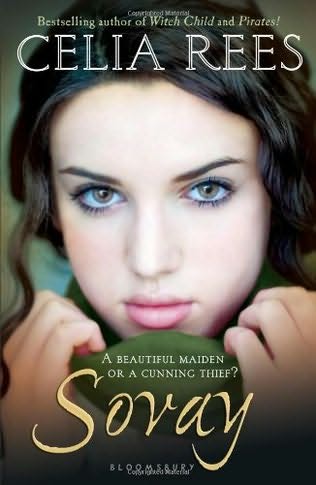 I won't go into much detail. It was fun. It was enjoyable. It was delightful. Most of the reviews of this one that I've come across have found it disappointing in one way or another. The readers have read other books they feel are better or more worthwhile. I haven't had that much experience with this time period, with this subject. So I didn't find it disappointing. I didn't find it unoriginal or uninspired. I found it entertaining and well paced. I enjoyed every minute I spent with this one.
I won't go into much detail. It was fun. It was enjoyable. It was delightful. Most of the reviews of this one that I've come across have found it disappointing in one way or another. The readers have read other books they feel are better or more worthwhile. I haven't had that much experience with this time period, with this subject. So I didn't find it disappointing. I didn't find it unoriginal or uninspired. I found it entertaining and well paced. I enjoyed every minute I spent with this one.
Here is the UK book cover. Which cover do you like best?
© Becky Laney of Becky's Book Reviews
Blog: Becky's Book Reviews (Login to Add to MyJacketFlap)
JacketFlap tags: friendship, YA Fiction, 2008, YA Romance, YA realistic fiction, teens in trouble with the law, bullies, "L" Titles, "H" Authors, Add a tag
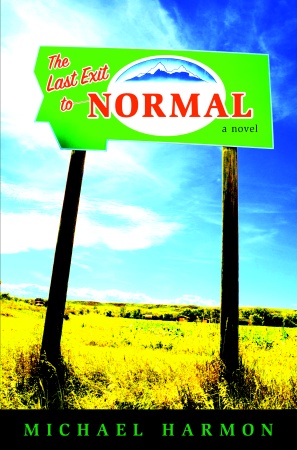
Harmon, Michael. 2008. The Last Exit to Normal.
The decoder card to the universe wasn't included in the box of cereal God gave humanity. At the ripe old age of seventeen, I'd at least figured out that no matter how hard you try to guess what happens next, you can't. Life wasn't set up that way and we don't like it, so we spend most of our time running around like a bunch of dimwits.
Ben Campbell, our narrator, I must admit, is one of my favorite characters of the year. He makes this book work for me. The story itself? It's as simple and complex as life itself. Ben moves with his two fathers to a small Montana town after Ben has some emotional problems after the big reveal and its aftermath. (His father is gay; his mother moved out and away.) The three move in with Edward's mother, Bonnie Mae Ingerson. And let me tell you, Bonnie Mae is quite a character. Character with a capital C. (Just one of many reasons why I love this one!) The book is a coming of age story of a boy coming to terms with his life as it now is. It's about a boy learning that it's okay that it's not okay. It's more than that. It's about life and love; work and play; friends and enemies. It's about a boy becoming a hero, making a stand when and where he can.
I can't promise you'll love this one. (I did though.) But you should definitely give it a try.
© Becky Laney of Becky's Book Reviews
Blog: Becky's Book Reviews (Login to Add to MyJacketFlap)
JacketFlap tags: YA Fiction, dysfunctional families, 2008, YA realistic fiction, teens in trouble with the law, cybils 2008, Add a tag
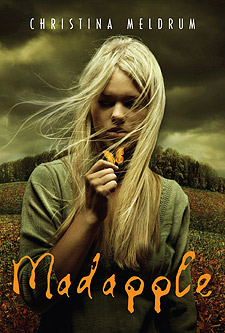
Meldrum, Christina. 2008. Madapple.
The women resemble schoolgirls with gangly limbs, ruddy cheeks, plaited flaxen hair; they walk holding hands.
Weird and sometimes wonderful is how I'd describe Madapple by Christina Meldrum. It's not a novel for everyone. It's a bit dark, a bit moody, at times overwhelming, and not a bit traditional. It's a complex plot in a way. Well written. Well imagined. But very weird. Of course, there are plenty of folks that would read that description and think "this is the book for me!"
Set in the modern world--in America to be exact--the book has a very strange otherworldly feel to it. In part because our heroine, Aslaug, has been raised in isolation. Her mother, Maren, is a hard woman to know, to understand, to love. The two have been living in the country, living off the land for the most part. Aslaug has never attended school or church. She's never interacted or associated with anyone really. Though the two did occasionally venture into the nearest town to collect their mail and buy a few supplies now and then. But she's never known about the real world. She's lived a very sheltered, very odd existence. The information that her mother thought was most important to pass down to her daughter--and the information that her mother chose to conceal--is what sets Aslaug apart from her peers. What Aslaug knows is the natural world--the world of herbs and plants and weeds (roots, barks, etc.) She knows what plants are poisonous, and which ones aren't. And it is this knowledge of the natural world (in some ways associated with witches and witchcraft) that get her into trouble as the reader learns.
Maren, Aslaug's mother, dies of cancer. Though the powers-that-be suspect foul play for a bit and place Aslaug under arrest. (True, it was a bit strange that this teenage girl would try to bury her mother in the back yard after discovering her body instead of calling the authorities and arranging for a proper burial. But this "mistake" makes sense in connection with Aslaug's upbringing. What does she know of the authorities? Of the police? Of what's proper and improper?)
After Maren's death, Aslaug goes to stay with her mother's sister--her aunt Sara--and her cousins, Sanne and Rune. One might for half a second think this would be an improvement for her. That she would learn what it was like to be normal, to be loved....but no....this family she now finds herself in is just plain weird. Weird and a bit delusional. A bit out-of-place. Completely alien-outsider-culture going on in the midst of a modern day setting. What makes them so weird? They're cult-like, ultra-weird, non-traditional, spiritual-religious environment where everything's turned inside out and upside down and given a good shake or two.
Did I like it? Yes and no. I can see that it's well done. But it's a bit too weird for my personal taste. Don't get me wrong. I'm glad I read it. I couldn't put it down. It had me hooked from almost the very start. But once is enough for me. I won't be rereading it anytime soon. But I wouldn't be surprised to read that others loved it. Or if it began receiving attention on best-of-lists, etc.
I don't know if this description will make sense to anyone or not...but this is a thunderstorm of a book. You know how some people love the sound of rain, wind, and thunder...and others not so much. It's just a very symbolically-stormy kind of book.
© Becky Laney of Becky's Book Reviews
Blog: Becky's Book Reviews (Login to Add to MyJacketFlap)
JacketFlap tags: dysfunctional families, 2008, teens in trouble with the law, YA Mystery, "H" Titles, YA Thriller, "S" Authors, YA Suspense, Add a tag

 Sanders, Scott Loring. 2008. The Hanging Woods.
Sanders, Scott Loring. 2008. The Hanging Woods.
What can I say about this one? Really? Truly? It's dark. It's depressing. It's truly dreadful--dreadful in content, not style. It's disturbing, very disturbing. A difficult read, a discomforting read. Warped. Twisted. And oh-so-wrong.
First sentence: "In 1975, when I was thirteen, I killed a fox. It happened a few weeks after I'd snuck into my mother's room and read her diary. That diary told me a lot of things that I didn't want to know. Or maybe I did want to know them. I can't say for sure."
The good news is that you should be able to tell fairly early on whether or not The Hanging Woods is for you. In the first chapter alone we've got the slaughtering of a fox and a chicken. (And the two aren't connected. The fox wasn't after the chicken.) In the second chapter, we see many signs of unhealthy relationships. Relationships between friends. Relationships between families. And we see our first human death. Very bizarre. Not exactly murder. Not exactly calculated. But strange indeed. And in the third chapter, we learn that our narrator, Walter, committed arson. He burned a house down. So right from the start you know this is going to be one dark-and-weird book. It's not for everyone. The language. The violence. The subject matter. It just paints a very dark and unpleasant portrait of humanity. Not that I'm denying that humans can be ugly and cruel and tortured and demented and perverted and whatnot. But dismal, dismal, very dismal.
The Hanging Woods is about the breakdown of friends, of family, of the mind itself.
Personally, I don't like dark and edgy all that much. I prefer my narrators a bit more sane. HOWEVER I know that some readers will appreciate this one. It is well written. If it had been poorly written, I wouldn't have found the strength to keep reading.
Edited to add: I slept on this one. Given it some more thought. And I wanted to add that it was really well done. When characters are so thoroughly written, so powerfully drawn that you have to keep reading even if you personally hate where they are going...then that says something about the writing. So for skills in writing, in characterization this one gets my approval.
© Becky Laney of Becky's Book Reviews
Blog: Becky's Book Reviews (Login to Add to MyJacketFlap)
JacketFlap tags: international literature, Travel the World, Speculative Fiction Challenge, teens in trouble with the law, science fiction, Add a tag
Blog: La Bloga (Login to Add to MyJacketFlap)
JacketFlap tags: José Latour, RMBPF, Aaron A. Abeyta, Abiquiú, Add a tag
Manuel Ramos

Aaron A. Abeyta is a Colorado native and professor of English at Adams State College. For his collection, Colcha (University Press of Colorado, 2000), Abeyta received an American Book Award and the Colorado Book Award. Abeyta's other titles, both from Ghost Road Press, are a collection of poetry, As Orion Falls (2005) and a novel, Rise, Do Not Be Afraid (2007). Abeyta is also the recipient of a Colorado Council on the Arts fellowship for poetry. He lives in Southern Colorado where he can remain close to his family and culture, both of which greatly influence his work. Abeyta was born in 1971.
I recently met Aaron through the auspices of El Laboratorio, an exciting new literary project featuring several Colorado-based writers, and he agreed to answer a few questions for La Bloga. Now that I have read his novel I am even more pleased that I was able to do this interview. I think Aaron is a talented writer and that his voice is unique and adventurous: very much Southern Colorado (El Valle de San Luis, actually), and very much in touch with the passions of the Valley gente.
One reviewer of your novel said that the prose is "beautifully rendered" and that each chapter stands alone as a long poem. I agree about the beautiful prose. Do you think of your book as poetry? And I guess I am curious about why a poet would write a novel.
I never considered the book to be poetry, but I did make a very conscious effort to make the book image driven and lyrical, both of which are two of the building blocks of poems (and fiction too, at least the fiction I like to read). So, in that regard, I guess the book has qualities of poetry.
I think it’s a bit odd, however, that the reviewer stated that each chapter was a long poem; that was not my intent at all, but I can’t say that I was upset by those comments; I took it as a compliment.
As for why a poet would write a novel, that’s a very good question. I don’t really know, definitively that is. I do know that I sat down to write one day and it came out as prose (which is typically the way I begin all my poems, i.e. long hand, full margins, get all the ideas down and then go back and cut and cut). The difference this time was that I pretty much left the cuts out of it and went back the next day and wrote another chapter. All in all, I wrote a chapter each day and the novel actually wrote itself, sort of consuming my every thought. I literally dreamed about sequences and characters. I just followed the impulses that came to me. The reviewer mentioned that the village was the character; she alluded to Faulkner in this regard. It was the village of Santa Rita that got me writing in the first place. It is a real place that I loved as a kid; you can’t go there now without permission. The place is completely private and the road in is locked shut by an iron gate. When I saw the gate I knew what I wanted to write about, but the particulars seemed to somehow take care of themselves.
Another reviewer compared your novel, favorably, to Gabríel Garcia Márquez,noting that Santa Rita, the setting for your book, reminds one of Macondo, García Márquez's fictional Colombian town. I was taken by the elaborate levels of characterization, the creative imagery, and the non-linear approach to the narrative. Where did all this come from? In other words, what is the inspiration for your style of writing?
I learned early on, mostly from my abuelo, that a story is a living thing. I don’t ever remember hearing a story that began at A and ended at Z. I didn’t grow up with typical plot structures as a model. My mom didn’t read Mother Goose to me, or anything of the sort. I tell people that and they look at me like I was abused, as if to say that my parents not reading to me was some sort of 20th century crime. I never felt deprived, however. Everyone around me told great stories, and those were my bedtime stories. For example, my abuelito would tell a story and then a few weeks later I would hear the same story from the sheepherder and they were remarkably different, yet essentially the same. The teller of the story was always the heart, the information the blood and the listener the soul. I try and remain true to this model, not only in the novel but in all my writing. I guess my people were born of circles because that’s the way we still communicate.
As for the imagery and characterization, the imagery has always been a matter of paying attention to things around me, little things. I specifically look for things that most people wouldn’t notice and make a mental note to somehow use that somewhere in my writing. The characters, many of them, were based on real people, but a lot of them were dreamt or hybrids of classical literary figures and real people. For example, and I hope I don’t tip my hand too much with this, Nomio is based on some very real people in my life, but the name Nomios is another name for Hermes. Apollonio is Apollo, but he is also human in that some of his characteristics are based on people I grew up around. All in all, every name, well most of them anyway, are allusions to real, literary, religious or historical figures. The names were my way of developing characters that were already familiar but without making them too obvious; they were also a way of paying tribute to all of my influences. Sorry for the long answer. I got carried away.
I think the novel is complicated in the sense that the layers of characterization and interwoven stories require a reader's undivided attention and a commitment to pay attention to the details. This is not a criticism. I think your cast of characters at the beginning of the novel hints that you may agree with me. Do you?
The cast of characters at the beginning was not really my idea, per se. My publishers wanted a family tree, like the one that Gabriel García Márquez used at the beginning of 100 Years of Solitude. The problem, however, was that the characters weren’t from the same family. There would have been about 6 or 7 family trees. As a compromise we decided on the cast of characters option. If it would have been up to me, and in the end I guess it was, I think I would have left the character list out, but since the names of the characters are very traditional and therefore not common we (the publishers and myself) agreed that we should provide some sort of assistance to the reader. I know that one reviewer took exception with this and even hinted at there being too many characters for such a “thin” book.
To answer your question though, I really did want the book to be accessible on a lot of levels. I wanted each story to stand on its own but also to be part of a bigger whole. I wanted allusion to play a major role in the book, but I didn’t want the reader to feel obligated to look everything up. Therefore, yes, I suppose the book is complicated, but I would also hope that on the most basic level it is also as simple as listening to a story being told.
________________________
Aaron's website is www.aaronabeyta.com. He wanted me to make sure folks know that his books can be found at bookstores, through Ghost Road Press, and at online outlets such as Amazon and Barnes & Noble.
Thank you, Aaron.
... y más
Abiquiú Studio Tour
There’s a nice article (Georgia On Their Minds) in Lexus Magazine (yes, that Lexus) about the annual Abiquiú Studio Tour, a unique art festival in the heart of New Mexico. Each October for the past 13 years the collective of more than 60 artists opens its work spaces and homes to visitors who are bound to be charmed by the wide-ranging vision and diverse mix of painting, etching, sculpture, weaving, and many other formats. Included in the article are short interviews with several of the artists such as Leopoldo Garcia, described as “a ponytailed Vietnam veteran with a linebacker’s build and a voice that rasps and burbles like a cabin-cruiser at low tide,” and Barbara Manzanares, a weaver who says that her mother always told her “if you learn to weave you’ll never be hungry.” October is one of the best months to spend time in New Mexico and this festival sounds like a perfect way to spend that time. Abiquiú and the Ghost Ranch are indelibly linked to Georgia O’Keeffe as the places where she found inspiration and solace. You can read more by jumping to this link.
José Latour on Selling Culture
The International Association of Crime Writers’ website now offers articles by members. Included in the lineup is an article by José Latour, entitled The Influence of Promotion on the Entertainment and Cultural Markets. Here are a couple of paragraphs from the article:
“Ninety- and one-hundred-year-old copies of newspapers and magazines from the U.S., France and Spain prove that books were reviewed frequently, but publicity and advertising were almost nonexistent. Until the 1910s, perhaps the 1920s, the number of copies a book sold and the attendance at cultural events were mostly the result of reviews and word of mouth. Most publishers saw themselves as purveyors of culture; they didn't want to lose money, but making money was not their raison d'être. Bookselling was considered a very dignified way of making a living.
“A hundred years later books are merchandise in the marketplace. In fiction and non-fiction alike, publicity and advertising are determinant. In mass-market fiction, promotion is indispensable. The big chain stores have a single purpose: to make money. Independent publishers and booksellers, among whom, it seems, many idealists continue to exist, also depend on good- and best-sellers to survive.”
The entire article is here.
Rocky Mountain Book and Paper Fair
The 23d Annual Rocky Mountain Book and Paper Fair will be held at the Merchandise Mart in Denver on August 3 and 4. Over 75 dealers will have on hand “an outstanding collection of books and vintage ephemera for sale” including maps, art and photographs. The press release notes that some of the items on display or for sale include first editions of John C. Fremont’s report of his first three expeditions and his role in the conquest of California (sounds like right up your alley, Sol); L. Frank Baum’s Glinda of Oz; John Arrowsmith’s map of the Republic of Texas, John Steinbeck’s Of Mice and Men; and Dr. Seuss’ How the Grinch Stole Christmas. Get many more details here.
Later.



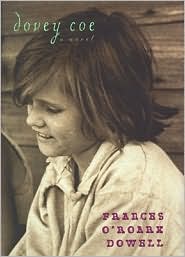

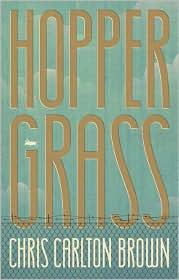

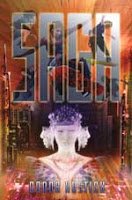

It sounds really intruiging. I must look into this one.
This kind of stories are my one of my fave must read stories. It sound so interesting.